This post may contain affiliate links. Please read our disclosure policy.
Light and sweet, these miniature gluten free vanilla scones are just like the two-bite Starbucks treats. Perfect for your morning coffee.
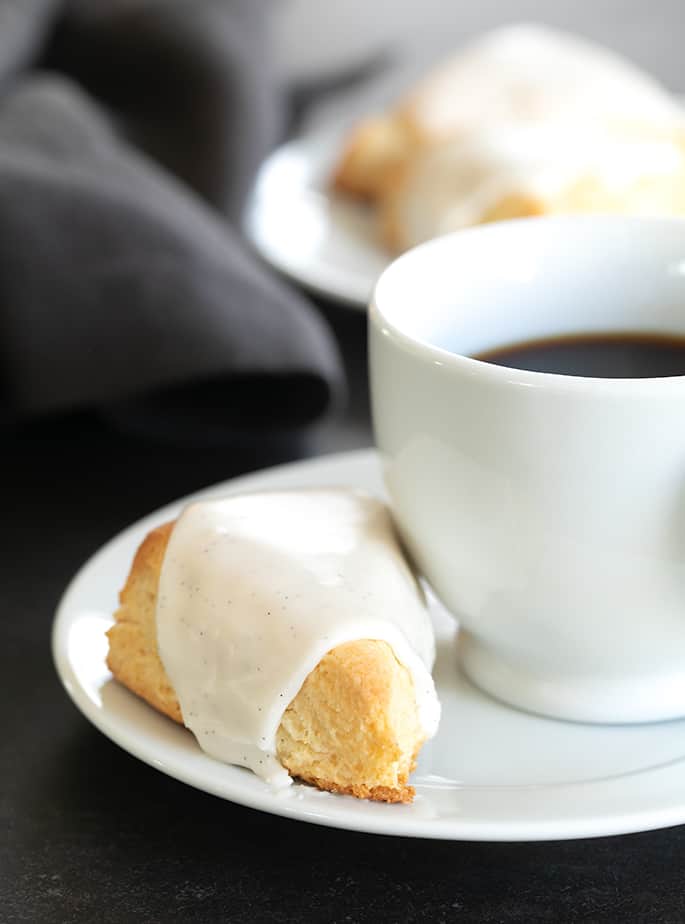
Table of Contents
- Why make a Starbucks copycat gluten free vanilla scone?
- How to make light and flaky scones
- What makes this recipe for gluten free vanilla scones so special
- Can you make these petite gluten free vanilla scones ahead?
- Can you add blueberries or other fruit to these scones?
- Starbucks-Style Vanilla Gluten Free Scones: Ingredients and substitutions
- Petite gluten free vanilla scones recipe
- Gluten Free Vanilla Scones Recipe
Why make a Starbucks copycat gluten free vanilla scone?
Do you know how sometimes parents will go to Starbucks and get themselves a coffee and order their child a cake pop, a cookie or a scone? Well, I might have been inclined to do something like that when my son was little, but there are no gluten free cake pops at Starbucks. And no two-bite, light and no sweet petite gluten free vanilla scones.
My son is 15 now, and he won't set foot in a Starbucks (or nearly anywhere) with me these days. But if he were little and I had this option, I'd be sure to stock my freezer with these little scones and pop a few in my bag when we set out to drop his big sister at preschool.
The Starbucks petite vanilla scones are perfectly sweet (they're meant to be a treat, so don't get all upset about the sugar!), tender and light, and the vanilla flavor in the pastry and the icing is the real deal.
Since these pastries are petite, we get a full 16 scones from the recipe. I think these would be perfect for a lunch, brunch, baby shower, and perfect for Easter.
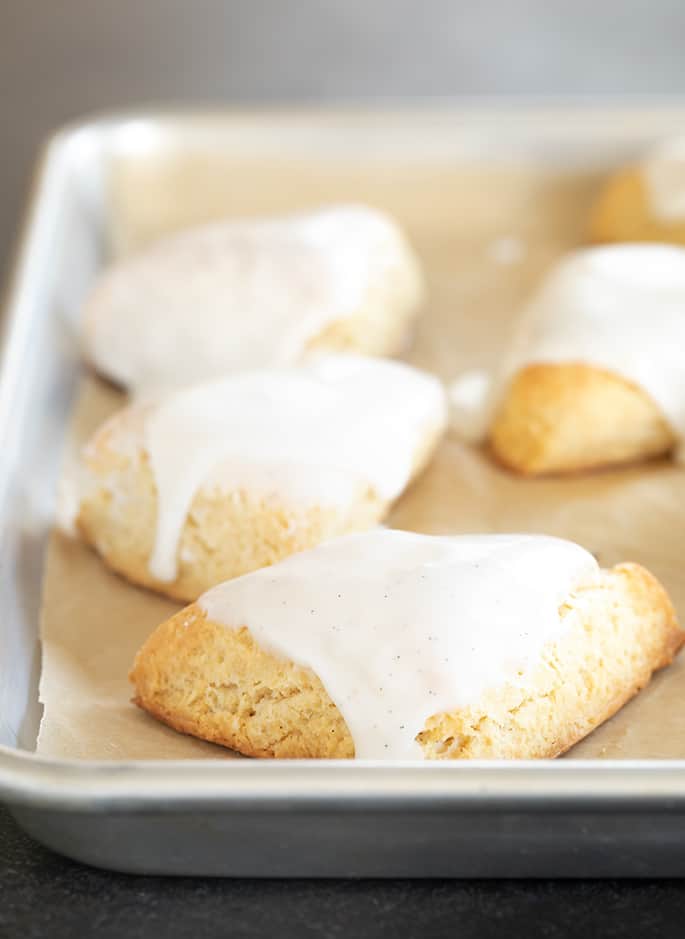
How to make light and flaky scones
Scones are very similar to biscuits (since I'm in the U.S., biscuits are pastries, not cookies!), but they tend to be a bit firmer and aren’t quite as flaky as biscuits. They’re still a pastry, but they’re a bit drier than biscuits.
But the technique for making these scones light and flaky is the same as for our extra flaky gluten free biscuits—and for any pastry, really. Large chunks of chilled butter get tossed with the dry ingredients. If you aim for pieces of butter that resemble “small peas,” as many pastry recipes recommend, you'll make flat pastry.

What makes this recipe for gluten free vanilla scones so special
These scones aren't exactly like my typical gluten free scone recipe, as there's an egg in the dough. The Starbucks petite vanilla bean scones have eggs, as listed in their ingredient list. My copycat recipes always begin with the original product's ingredient list. Sometimes, what's in there surprises me.
You only bake them for 10 minutes, which is just enough time for these sweet little scones to become puffed and pale golden. They should be cold before they go in the oven. Making your raw scones super cold really helps them to puff.
And don't skip the folding and the puff-pastry-like turns in the recipe instructions. They make all the difference. Well, the real vanilla bean seeds don't hurt either.

Can you make these petite gluten free vanilla scones ahead?
Yes, you absolutely can make these scones ahead of time. All forms of pastry tend to store really well in the freezer, both shaped and raw, and after they've been baked.
How to freeze these gf vanilla scones raw
Like biscuits, these scones can be frozen once they've been shaped. Just freeze them, once cut, in a single layer on a baking sheet and then pile them into a freezer-safe bag before returning them to the freezer.
They can be baked as directed in the recipe instructions as frozen, without defrosting them first. You will need to add a minute or two to the baking time. If you place them on a baking sheet as you're preheating your oven, though, extra baking time likely won't even be necessary.
How to freeze baked gf vanilla scones
The icing on these scones is made very thick so it's dry to the touch once it's set. That means that you can even make the recipe all the way to end, including the icing, before freezing them.
Just place the baked, cooled and iced scones in an even layer on a baking sheet and place the sheet in the freezer. Once they're frozen solid, just pile the scones into a freezer-safe bag, squeeze out the air as best you can and return them to the freezer.
I recommend defrosting them at room temperature. That can be on a plate on the counter, or in a portable container in your bag.
Can you add blueberries or other fruit to these scones?
No, I don't recommend that. Berries or other fruit contain more moisture than this recipe can accommodate, as it gets released in the oven.
Instead, try our recipe for gluten free blueberry scones. For other types of mix-ins, try our master gluten free scones recipe.

Starbucks-Style Vanilla Gluten Free Scones: Ingredients and substitutions
Dairy free gluten free vanilla scones
In place of the chopped and chilled butter in this recipe, try using Melt or Miyoko's Kitchen brand vegan butter. They are a bit softer than butter even when chilled, so make sure your other ingredients are ice cold.
You can also try using Spectrum nonhydrogenated vegetable shortening (butter-flavored, if possible). Shortening will become absolutely solid, though, if it's chilled too much (and certainly if it's placed in the freezer for any length of time), so you can't work with the dough in exactly the same way.
I recommend measuring out the shortening by weight and then placing it in the refrigerator until it begins to firm up. Then, add it to the dry ingredients as you would the butter by adding it in small scoops. It will flatten easily as you mix in the wet ingredients.
In place of the heavy cream, you can use canned coconut milk. The nonfat dry milk can be replaced with powdered coconut milk, which is more and more readily available all the time.
Gluten free egg free vanilla scones
Since there is only one egg in this recipe, you can try replacing it with a “chia egg” (1 tablespoon ground white chia seeds + 1 tablespoon lukewarm water, mixed and allowed to gel). A “flax egg” will add color and an unpleasant flavor, so I recommend staying away from that.
Gluten free corn free vanilla scones
In place of cornstarch, try using arrowroot. It's usually a great substitute for cornstarch in baking.
What is Lyle's Golden Syrup, and how can I make gluten free vanilla scones without it?
This is a British invert sugar that adds liquid sweetness without the added flavor of honey. I like it best in this recipe. However, if you can't find it in the imports section of your grocery store, you can replace it with light corn syrup or even honey if you don't mind the added flavor.
Petite gluten free vanilla scones recipe
Gluten Free Vanilla Scones Recipe
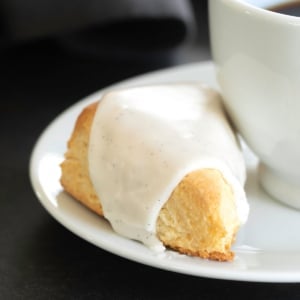
Ingredients
For the scones
- 1 ⅝ cups (227 g) all purpose gluten free flour blend, (I used Better Batter; please click thru for appropriate blends), plus more for sprinkling
- 1 teaspoon xanthan gum, omit if your blend already contains it
- 5 tablespoons (30 g) dry milk powder
- 3 tablespoons (27 g) cornstarch
- 1 ½ teaspoons baking powder
- ¼ teaspoon baking soda
- ½ teaspoon kosher salt
- ¼ cup (50 g) granulated sugar
- 5 tablespoons (70 g) unsalted butter, chopped into chunks (about 3/8-inch square) and chilled
- 1 (50 g (weighed out of shell)) egg, beaten and chilled
- Seeds from half of a vanilla bean
- 2 tablespoons (42 g) Lyle’s Golden Syrup
- 1 tablespoon pure vanilla extract
- ⅔ cup (5.33 fluid ounces) heavy whipping cream, chilled
For the vanilla bean glaze
- Seeds from, other half of a vanilla bean
- 1 ½ cups (173 g) confectioners’ sugar
- 2 tablespoons milk, plus more by the 1/4 teaspoonful, if needed
Instructions
- Preheat your oven to 375°F. Line a rimmed baking sheet with unbleached parchment paper and set it aside.
Make the scones.
- In a large bowl, place the flour, xanthan gum, nonfat dry milk, cornstarch, baking powder, baking soda, salt and granulated sugar, and whisk to combine well.
- Add the chopped and chilled butter, and toss to coat it in the dry ingredients. Flatten each chunk of butter between your thumb and forefinger.
- Whisk the egg, seeds from half a vanilla bean, Lyle’s Golden Syrup (or honey) and vanilla extract into the milk or cream.
- Create a well in the center of the dry ingredients and add the milk or cream mixture. Mix gently until the dough begins to come together. The dough will be somewhat sticky, unlike most other pastry dough.
- Turn out the dough onto a lightly floured piece of unbleached parchment paper and press into a disk. Sprinkle the top lightly with additional flour and roll out into a rectangle that is about 1-inch thick.
- Fold the dough over on itself like you would a business letter and then press into a square. Sprinkle the dough again lightly with flour, and roll out the dough once again into a rectangle about 1-inch thick.
- Repeat rolling and folding if you are willing (it really does make for flakier, smoother pastry).
- Finally, sprinkle the dough lightly with additional flour and roll it into a 7-inch square that is about 3/4-inch thick. The dough should have a smooth, even surface. Using a sharp knife or bench scraper, cut the dough into 4 equal squares.
- Cut each square into 4 equal triangles by cutting an “X” through the center of the square. Place the wedges about 2 inches apart from one another on the prepared baking sheet, and chill in the freezer until firm (about 10 minutes).
- Remove the baking sheet from the freezer and place in the center of the preheated oven. Bake until the scones are puffed and very pale golden (about 10 minutes).
- Remove from the oven and allow to cool for 10 minutes on the baking sheet before transferring to a wire rack to cool completely.
Make the glaze.
- In a small bowl, mix the seeds from the (other) half of a vanilla bean into the confectioners’ sugar until the seeds are evenly distributed throughout the sugar.
- Add 2 tablespoon of milk, and mix well, until a very thick paste forms. Add more milk by the 1/4-teaspoon, mixing to combine well, until the glaze falls off the spoon slowly, in a very thick but pourable glaze.
- Add milk very slowly, as it is much easier to thin, than to thicken, the glaze. If you do thin the glaze too much, add more confectioners’ sugar a teaspoon at a time to thicken it.
- Either dip the tops of the cooled scones into the glaze, or spoon it on top of the scones and spread into an even layer. Allow the glaze to set at room temperature before serving.
Video
Nutrition
Nutrition information is automatically calculated, so should only be used as an approximation.
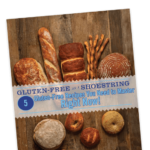
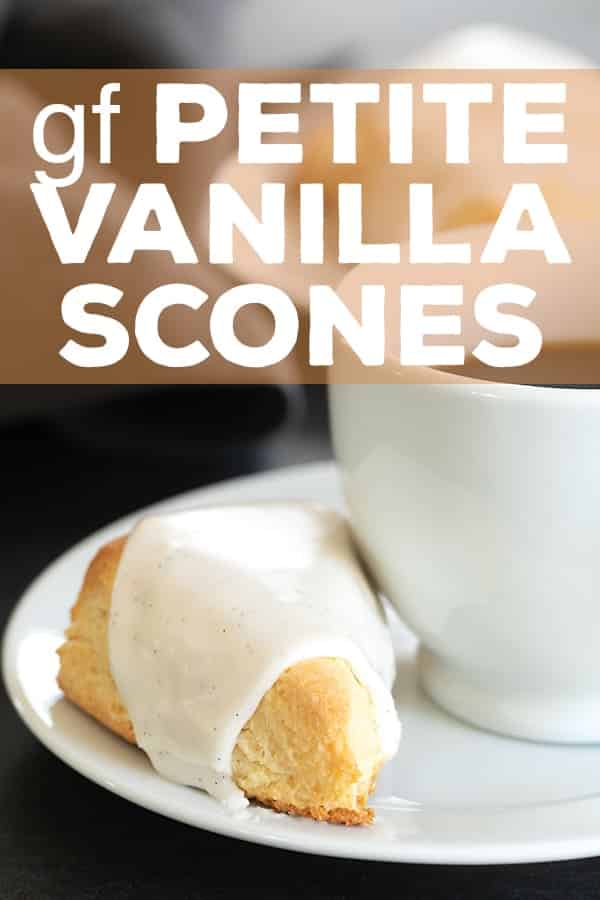
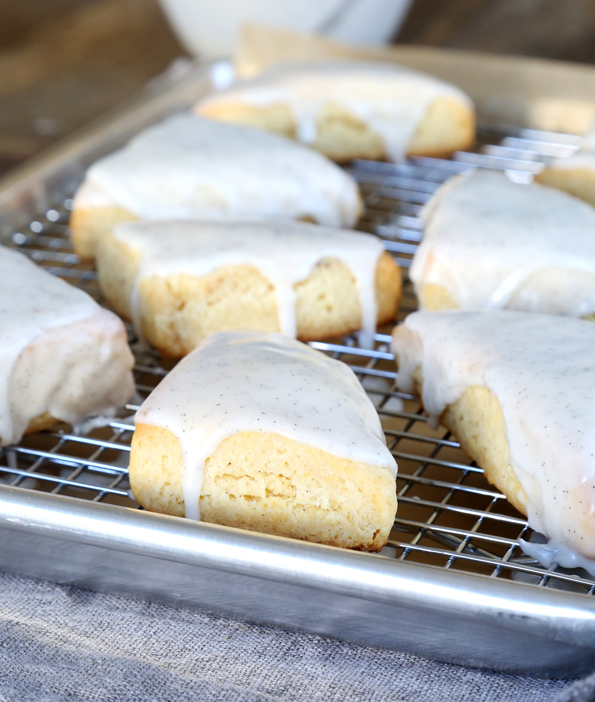
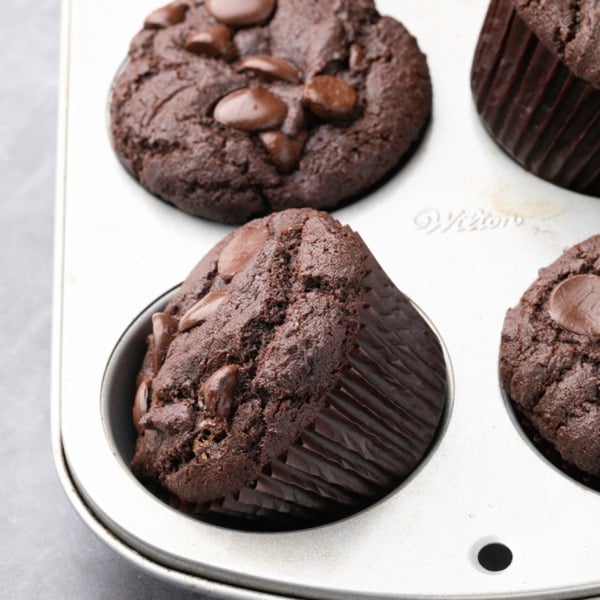
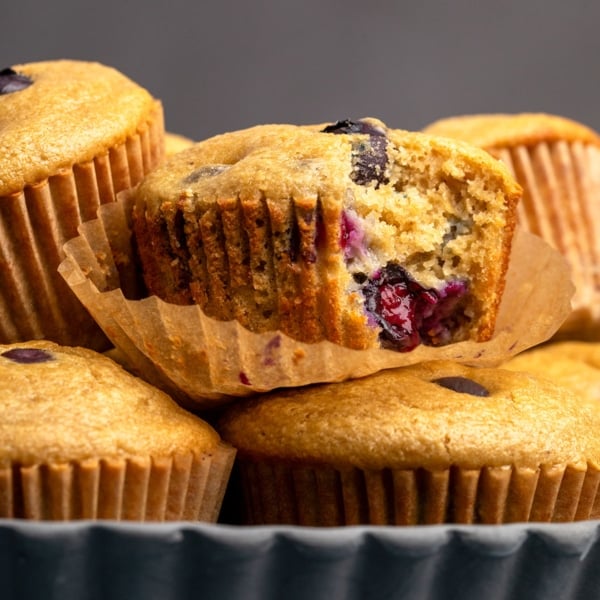
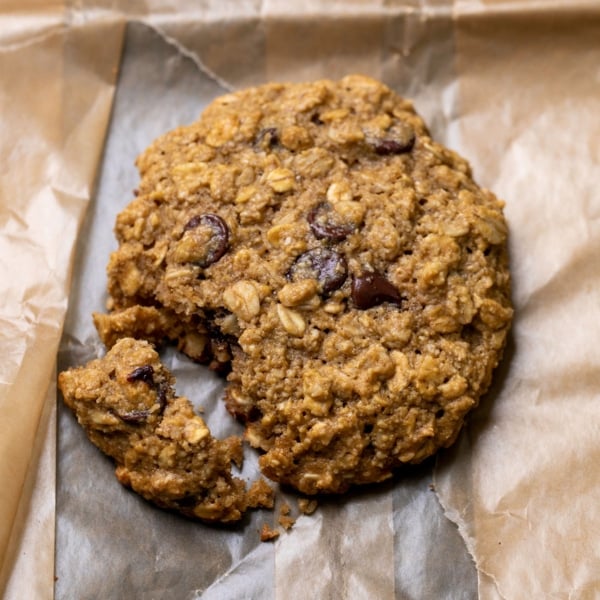
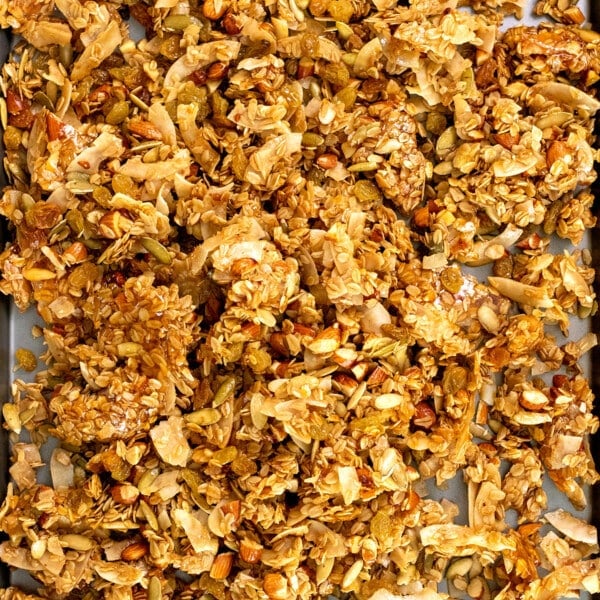









Is Lyle’s golden syrup different to generic golden syrup?
I’m afraid I don’t know, Natalie! The only golden syrup we have in the U.S. that I know of is Lyle’s.
It’s rather simple, use a scale.
I have these baking right now for dinner- we are having them with eggs, bacon and hot chocolate. The dough smells so good! I can’t wait to try them! Thanks!
Love it, Kat!
These are outstanding! And so pretty! We will be making them often. Also just to show some love – I have all of your books and cannot wait for the new one!!
NIcole, If these are anything like your pumpkin Scones…WOW, becasue my family and guests LOVED them…anyway, can Karo syrup (light not dark) be use in place of Lyles? I see you subbed honey in there…just wondering, thanks!
I honestly think that light Karo syrup would work better than honey, Got2b, since it won’t lend any flavor like honey would. Go for it! P.S. I love those pumpkin scones, too! So glad they’re a hit in your house. :)
These go together SUPER fast, especially since nothing needs to be room temp! I’ve been hoarding vanilla beans waiting for this very moment. :) My house smells delicious and the scones taste amazing. Nice and flakey scones with yummy sweet icing (and not dry like i remember the Starbucks ones)! Awesome job! I’m having a baby in a week and had decided not to do any more baking before then but couldn’t resist these!
Nicole, of course after i baked ALL 16 i had a thought. Could this dough be kept in the freezer like we do the biscuits and pulled out to bake as needed?
Thanks again for all your hard work! You make GF delicious!
Wow, Erin, congratulations on that baby-to-be! I love that you made these already, not even 3 hours after I posted them. And yes – you could absolutely make and shape the dough, then freeze in a single layer on a baking sheet, and bake as the need arises. :)
This looks seriously delicious. I’m coming back to this when I need to make some GF scones!
YAY! YAY! YAY! Love these little buggers. Is it okay to use the vanilla bean paste? If so, what would you recommend?
Also, can you describe the business letter folding for me. I know I’m a pain. I made the cheddar biscuits last night (YUM!) and here’s how I interpreted it: fold rectangle in 3 folds and then fold it over the long way and then roll again. WOW – were they flaky!!! loved it.
Sounds perfect, Jennifer! Your folding is clearly top notch. ;)
You could definitely use vanilla bean paste in place of the vanilla extract and seeds. I haven’t made them that way, but it isn’t going to change the chemistry of the baked good much at all, so I wouldn’t worry a lot about exact amounts. Maybe try replacing the vanilla extract with bean paste 1:1 in the scones. For the glaze, it’s just going to be a moisture issue, so cut back on the milk initially and add it very slowly.
I need to make these. Like, right now! Luckily, I will right by the store with the vanilla beans this morning, so this looks like breakfast for tomorrow!
WHat if you don’t have vanilla beans?
I am curious why your recipes contain ingredients measured in such small increments? I never see a cookbook author do this. I was taught in school that you always convert the ingredients to the largest measurement. Why would you say 1 cup 10 tablespoons when you could have converted it to 1 1/2 cups plus 2 tablespoons. I have to say it is the one reason why I have not purchased your cookbooks, because I don’t want to have to do all that converting. Not to just be negative because you do a great job and make super recipes. But I have heard other people on celiac chatrooms talk about your inconvenient measurements being the drawback to your recipes.
I know Nicole weighs all of her ingredients and encourages us to do the same, so converting from weight to volume for those who want volume measurements makes the measurements not always an even number. After almost eight years gluten-free, I agree with Nicole. It’s so easy to weigh ingredients, a food scale is very inexpensive, and I find my baked goods come out so well when I do. It’s too bad people would not buy the book because they don’t want to weigh ingredients- they are missing out on some wonderful recipes!
I’m sorry you’re so unhappy with the way I write my recipes, Joy. I develop my recipes with weight measurements, as it is much, much more reliable and accurate, and then have to back into volume measurements. If you use a scale, you don’t have to convert anything.
That gluten free book from the CIA is unfortunately a real disappointment, fcar. Thank you so much for the kind words, and I’m so glad that you are enjoying the bread book!